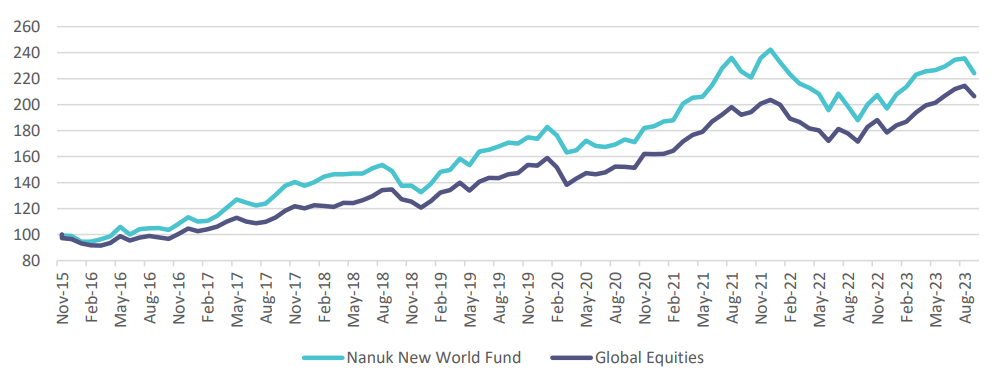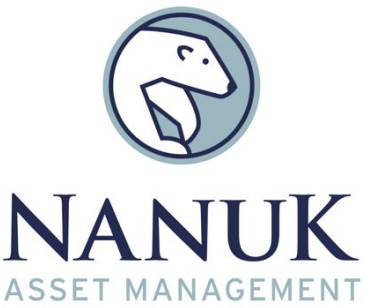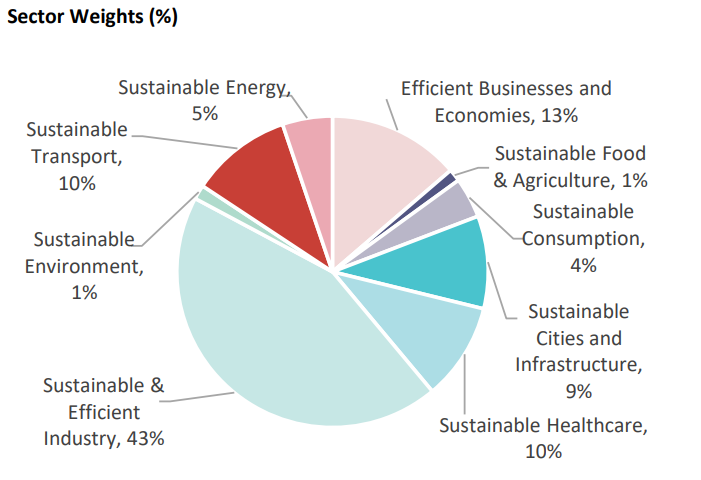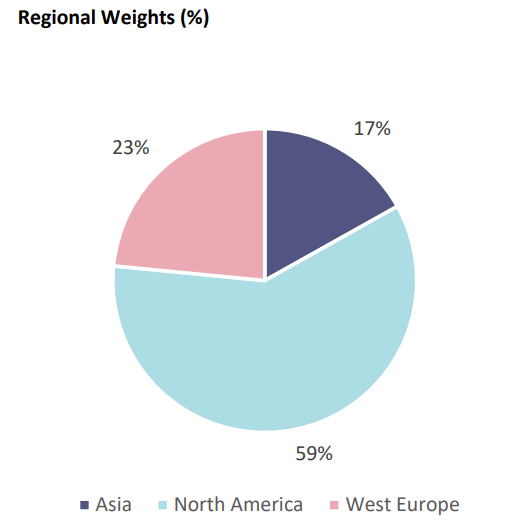A changing world and the trends shaping it: three sectors to look for global opportunities
We are all acutely aware of the way our world is changing. Some of that change is, to be fair, negative and worrying. If you are like me right now, you are concerned about the world we live in and life in general. Geopolitical tensions are increasing, while we are managing rising inflation and elevated interest rates. Yet the bigger transitions in our weather, health, technology and deglobalisation remain with us, shaping how governments think about what to do. As investors, these issues also influence how and where we want to invest.
Earlier this week, I caught up with Thomas King OAM, Chief Investment Officer and Portfolio Manager at Nanuk Asset Management. An engineer by background and an Olympic Gold Medal Sailor to boot (Sydney 2000), we talked about the Nanuk New World Fund (ASX: NNUK) and how he is seeing the opportunity set in global equities right now.
.png)
The chart below shows the Nanuk New World Fund performance since inception (2 November 2015) compared to global equities return as represented by the average of monthly returns on the MSCI All Country World Index and the FTSE All World Index

Global Equities Return is represented by the average of monthly returns of the MSCI ACWI Net Total Return USD Index and the FTSE All World Index Total Return Net Tax, using data derived from Bloomberg. USD indices are converted to AUD using rates at 4 pm London fix sourced from FactSet, consistent with Fund NAV calculations. Past performance is not indicative of future performance.
Note: This interview was conducted on Wednesday, 18 October 2023.
LW: Tell us about the Nanuk New World Fund: What’s your investment philosophy?
King: Over the coming decades, in response to environmental issues and resource constraints, the structure of the global economy will likely change. Investing in the industries that are benefiting from those changes successfully is likely to lead to good outcomes. The New World Fund is a global equities fund focused on industries related to the broad themes of environmental sustainability and resource efficiency.

We approach that investment challenge with a very conventional, fundamental, research-based approach. You'd probably call it 'quality at a reasonable price'.
We focus on buying good quality businesses that generate increasing economic value over time. They reinvest at high rates of return on capital, while also benefiting from the trends in the industries that we look at.
This doesn't just mean the long-term structural growth, but also the short-term shifts that are going on. Buying those kinds of companies at prices from which the odds of getting good investment outcomes are high; they have attractive valuations.
In most respects, it's a very vanilla proposition. It's a diversified global fund with around 70 stocks. It is fully invested with a low cash balance. It's relatively style-neutral, so it's not a growth fund or a value fund. It's a blend that shows up as being neutral from a style perspective. It’s available now as an unhedged fund or with a currency-hedged unit class.
Its defining feature is the sector and industry focus. As a firm, we focus on investing in industries and technologies that are contributing to improving environmental sustainability and resource efficiency. That covers nine broad thematic areas, most of which are fairly obvious things like clean energy, energy efficiency, and industrial automation. But it includes less exciting areas like waste management and sustainable materials and packaging and others.

LW: Are you bullish or bearish on the investment landscape currently?
King: There are lots of opportunities at the moment, far more than we've seen for the last four or five years. That's interesting and exciting for us as stock pickers and investment managers.
In a historic context, and relative to where interest rates are today, global equities are reasonably fairly valued, maybe slightly expensive, and likely to deliver medium-term returns around or slightly below their long run average of 7.5-8% in US dollar terms.
We've seen a period of significant underperformance in many of the areas that we look at. That's presenting us with a very interesting opportunity set, at a point in time where several factors are starting to become more favourable in terms of the outlook for those areas.
LW: Given the noise in the market around bond yields and geopolitics, is it currently harder for investors to focus on sustainability?
King: There are several facets of ESG that result in quite different implementations and quite different investment outcomes, and are done for different reasons. There are people who invest with an ethical lens and avoid particular parts of the market for that reason. Then there are people who invest with an impact or activist lens and are investing based on a desire to change the way that companies are behaving, so as to achieve better investment or better non-investment outcomes.
And then you've got funds like ours that are trying to capitalise on long-term shifts in the global economy. If you believe, as we do, that those things are happening, the approach is just as relevant today as it was one, two or five years ago.
Nothing has really changed in terms of the need and likelihood of the world shifting in that direction over time.
What has happened is that many of these strategies have underperformed, in some cases quite significantly, particularly the more growth-oriented and smaller-cap focused sustainability funds. They’ve been on the wrong side of both a shift away from growth stocks and a shift away from smaller mid-cap stocks. The market is shifting away from areas that tend to dominate the focus of sustainably themed funds and towards areas that are, generally speaking, not included - such as oil and gas and defence.
There has certainly been a lot of people disappointed by the performance of these funds. We've done better than most because we're far less growth oriented and much more style-neutral than many of our peers.
LW: When it comes to environmental sustainability and resource efficiency, what are the key metrics that you focus on?
King: Our investment approach is to seek out what we think of as good quality companies: good business franchises that are able to grow or improve their economic value through generating high or improving returns on invested capital. We look for businesses that are likely to benefit from the way in which their industries evolve in the medium term. Some of that can be related to shifts in sustainability or climate change policy. It might just be simple industry cycles in supply and demand, changes in industry structure, and more rudimentary economic drivers.
We apply that investment approach to a sustainably themed universe. In our investment universe, a company must have more than 25% of its value related to products and services that we believe improve, contribute to, or benefit from, improving global environmental sustainability and resource efficiency. That’s a somewhat subjective judgement that we make.
We define a set of industries and technologies that we think are appropriate. Then we find companies that have a material part of their value in those areas. We are concerned about governance and sustainability-related risks. We look at the nature of companies' governance, ownership and incentive structures.
We also look at the various aspects of sustainability that apply to the different stakeholder groups: customers, employees, supply chains, and the community.
But that's not to say we won’t buy a company that isn't perfect on those metrics. We’re seeking to understand the risks and make sure that we pay an appropriate price given the risk profile. We look for circumstances where the risk profile or the value will change because those things are improving.
If we can find companies that meet those criteria, we look to buy their stocks at prices we think are likely to outperform based on the prospective future value of those businesses.
None of that really involves a focus on particular ESG metrics, or prescribes that we only buy stocks with particular levels of carbon emissions or particular ESG scores, or anything else.
LW: Is your portfolio's majority exposure to companies that are in North America changing? How much innovation comes from other markets?
King: We run a fairly conventional global equity portfolio: 59% exposure to North America is a lower-than-average exposure. Global indices would typically have more like 70-75% in North America. We’re meaningfully underweight North America versus mainstream global indices.

That’s a function of our screening and stock picking, which is identifying better investment opportunities, better perspective returns in other parts of the world.
To answer your question about where we are seeing innovation investment: we see it all around the world. The Europeans were leaders in sustainability policy and still are. And that benefits many companies in the European market, and particularly the sort of the deployment of sustainability. Sustainable technology has been ongoing in Europe much longer than it has in other parts of the world.
North America is a hub of technology development, and we still see that as being the case. But an enormous amount of manufacturing and technology deployment is happening in Asia. China is by far the biggest end market for many of these sorts of technologies, and so Asia is equally relevant.
LW: Where do you see the opportunities emerging in terms of sectors?
King: We see opportunities in many areas of our opportunity set that haven't been there for years. The very significant underperformance of renewable energy stocks in the last six months is presenting opportunities in that space that haven't been available to us because of price and valuation over the last three or four years. That's an area that's continuing to grow around the world.
The wind industry is where we think we are likely to see prospects and growth improving in the near term, through increased policy and regulatory support. We have exposure to that, but it's not just about renewable energy.
Med tech devices are an area we look at, where significant efficiencies can be achieved in the healthcare system through the use of medical devices. That's a part of the market that has very substantially underperformed during the COVID period because of the interruption to healthcare services. More recently, it has underperformed through the potential impact of GLP1 weight loss drugs that will affect the demand for medical devices going forward. But because of the way that the stocks performed, there are certainly opportunities in areas like that.
There are opportunities in industrial automation, where we've seen policy support for reshoring manufacturing not just into the US, but now into Canada, Japan, and Europe. The construction of significant manufacturing capacity across a range of sustainable technologies will result in demand for industrial automation and control equipment that will help businesses like Siemens AG that we're invested in.
LW: What sustainability technologies or products don't really show promise from a stock perspective?
King: Anywhere you see high capital intensity and low returns, you've got to be very cautious. As an opportunity set you look at it and go, "no thanks".
If you look at something like electric vehicle charging infrastructure, there are several listed companies in the US that develop and deploy that kind of technology. But none of them make any money. They're very capital intensive and because of that, aren't generating economic value. Ultimately that means share prices, unless they're very cheap, are likely to underperform over time.
LW: What’s 2024 looking like?
King: I think we're in the midst of a period of significant scepticism about the outlook for sustainable technology and that has resulted in significant underperformance. It is in stark contrast to the situation a couple of years ago, when there was extraordinary optimism about the outlook for certain sustainable technologies.
I don't think that scepticism is warranted.
Despite all the problems in the world and the challenges governments face in balancing the rising cost of living with other priorities, they will continue to support policies that are helping address the world's environmental issues, particularly climate change issues.
The coming year will be a good time for investing in sustainably themed equity because it's one of those rare points where investment sentiment is quite weak. Valuations are low and over at least the medium term, and you're very likely to see an improvement and growth in those areas.
5 topics
1 stock mentioned
2 funds mentioned